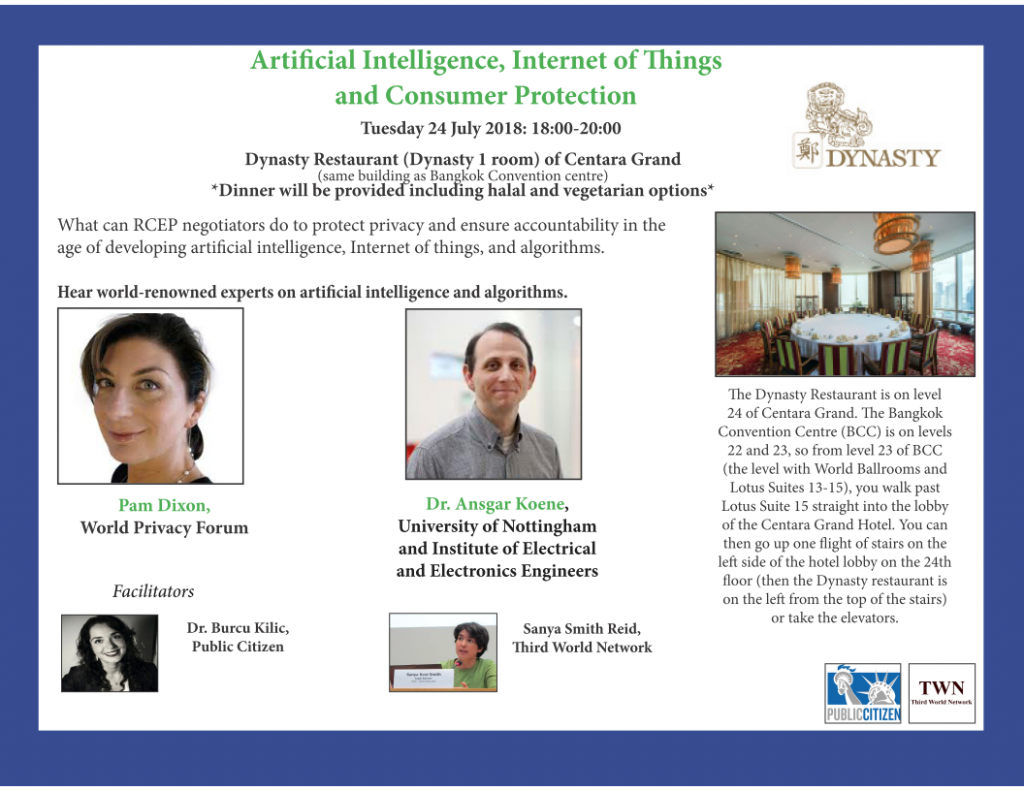
In response to the growing importance of algorithmic products in international trade, regional and international trade negotiations at the WTO and elsewhere are currently seeking to set down new rules regarding issues such as Intellectual Property and algorithmic transparency.
In order to try to avoid outcomes of the trade negotiations that inadvertently blocks algorithmic accountability, Ansgar is supporting Sanya Reid Smith of Third World Network in her efforts to brief trade negotiators on causes and consequences of algorithmic bias and the current status of regulatory and standards initiatives to address these issues.
On July 24th, the eCommerce negotiators for the Regional Comprehensive Economic Partnership (RCEP) of the ASEAN countries and ASEAN Free Trade Partners (AFPs) met in Bangkok and Sanya, together with Burcu Kilic (Public Citizen) arranged a dinner briefing on Artificial Intelligence, Internet of Things and Consumer Protection for the negotiators. At the heart of the briefing were two video presentations one by Pam Dixon (World Privacy Forum) and the other by Ansgar Koene.
The dinner was attended by negotiators from Australia x2, Vietnam x2, Laos x2, Philippines, Thailand, Malaysia x2, India x4, Indonesia, Myanmar, and the ASEAN Secretariat. The negotiators said they learnt new things, got food for thought, wanted copies of the slides and asked for our contact details etc.
The main text of the event invitation is reproduced below:
Artificial Intelligence, Internet of Things and Consumer Protection
Technology is becoming “smarter” everyday as devices learn about consumers’ every click, move, and buying habits. Artificial Intelligence (AI), the Internet of things (IoT) and algorithms have become part of our daily lives. These technologies shape how we access information, interact with other devices and share our personal information. They have the potential to revolutionize societies in positive ways. However, as with any scientific or technological advancement, there is a real risk that the use of new tools can have a negative impact on privacy and security.
The incredible amount of data which can now be collected is very valuable to companies vying for consumers’ business. With this increase in intelligence of this smart technology, personal data needs to be protected in every way possible.
Consumer privacy and data protection rights need to be protected and upheld to address potential harms. Regulators and companies need to create effective means and simple processes, so consumers can exercise their right to opt out of an automated process.
Understanding of how this technology works is essential for consumers and regulators to maintain control. In order to ensure technology enables trade, we need to develop a balanced picture of technology, privacy, technological and sustainable development issues.
AI’s effect on trade is not just in relation to goods, but also to consumers’ data that can be sent from these devices all around the world. As the trade agreements increasingly address the flow of data across borders as well as the algorithms that facilitate this movement, the questions arise as to how to ensure protection of privacy and consumers in trade agreements.
What can trade negotiators do to protect privacy and ensure accountability in the age of developing AI, IoT and algorithms?
The key questions we would discuss are:
- What is the effect of data flow across borders?
- What policies need to be implemented to increase algorithmic transparency and public control?
- What safeguards need to be put in place in trade agreements to protect data privacy and ensure accountability of AI?
